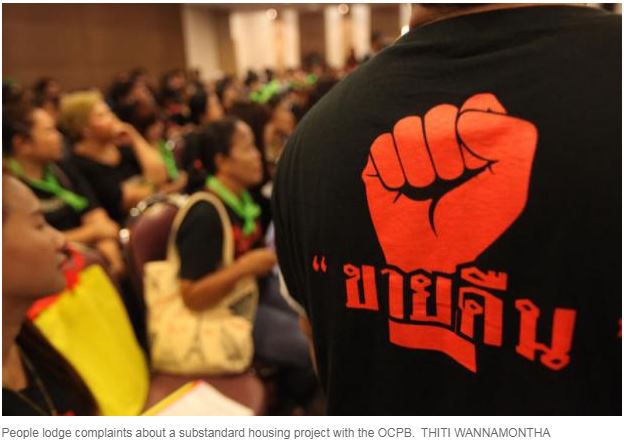Thailand: Consumer complaints down
Despite a decrease in the number of overall complaints in the first 10 months of this year, property and residential businesses remain unimproved, with the majority of complaints concerning condos, says the Office of the Consumer Protection Board (OCPB).
Pikanes Tapuang, deputy secretary-general of the OCPB, said most condo complaints were in Greater Bangkok for units priced at 1 million baht and above.
“The more condos are sold, the higher number of complaints we receive each year,” Mr Pikanes said. “Most condo complaints are from Thais, with a handful from Europeans who have units in Pattaya and Hua Hin.”
The OCPB receives complaints online at its website www.ocpb.go.th, which has an English-language option. The board plans to add Mandarin soon because of the rising number of Chinese buyers and consumers.
According to the OCPB, the number of consumer complaints during January-October 2018 dropped by 18% year-on-year to 6,139. Of the amount, 2,032 were from property and residential business, up from 2,028 in the same period last year.
In fiscal 2018, which ended in September, property and residential business posted the largest amount of consumer complaints with 2,384 cases, accounting for 31% of the total 7,676 from eight categories.
In the property and residential category, 48% or 1,141 cases were complaints about condos. That was followed by low-rise housing developments with 571 complaints, apartment or rental units with 447 and homebuilding with 103.
The top three reasons condo buyers were unhappy were developers unable to complete construction as promised (240 cases), defects found after getting a unit transferred (138), and contract termination and refund (93).
There were also 92 complaints from condo buyers about mortgage loan rejections, Mr Pikanes said.
“About bank’s mortgage loan rejection, developers promised that they would seek a source of loan for buyers but eventually they were unable to do so,” he said. “Some refused to refund the down payment to buyers after buyers could not seek a source of loan themselves.”
Each complaint submitted to the OCPB takes about two months to check and prove. More than half of the total cases end up in negotiation, and the rest go to litigation.
“Developers and contractors should be honest and do as committed to customers,” Mr Pikanes said. “If construction is delayed, they should notify them or give compensation.”
The most difficult cases involve severe defects or cracks in a building. This problem was found at both small and big developers.
Other gripes include development that does not resemble advertising or a change without notifying customers. These kinds of complaints usually end up in court, Mr Pikanes said.
“We plan to publish the names of developers or companies that are complained about and prosecuted on our website and in other media, but we need to wait for an amendment to the Consumer Protection Act that will be submitted to parliament by the end of December 2018,” he said.
Source: https://property.bangkokpost.com/news/1599702/consumer-complaints-down


 English
English




